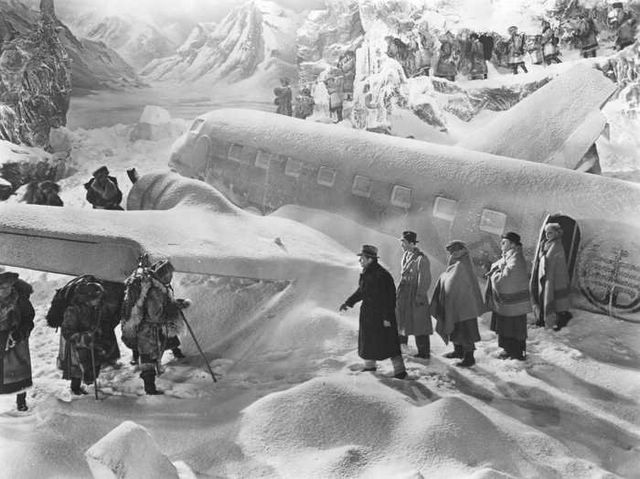After days of wild speculation, it appears that Malaysian Flight MH370 crashed somewhere in the South Pacific and that there are no survivors. It is all very sad. For a long while many clung to desperate hopes, including to one crazy rumor that the flight might be headed for the wilds of China. This particular imagined outcome caught my eye since that is, after all, what happens to the plane in James Hilton’s 1933 novel Lost Horizon. There, the wayward plane ends up in Tibet.
The story begins with one of literature’s first described hijackings, although this one is relatively benign. Hugh Conway and three other passengers find that their plane has been diverted from its original flight path and they are flying over the Himalayas. Given that MH370 apparently flew hours on autopilot–we don’t know what crew or passengers were doing during this time–it’s at least possible to imagine conversations like the following occurring on board:
It was after the flight had lasted more than an hour that Mallinson said he thought the pilot wasn’t keeping a straight course.
And a little later:
“My God!” Mallinson cried, peering through the window. “Look down there!”
Conway looked. The view was certainly not what he had expected, if, indeed, he had expected anything. Instead of the trim, geometrically laid-out cantonments and the larger oblongs of the hangars, nothing was visible but an opaque mist veiling an immense, sun-brown desolation. The plane, though descending rapidly, was still at a height unusual for ordinary flying. Long, corrugated mountain ridges could be picked out, perhaps a mile or so closer than the cloudier smudge of the valleys. It was typical frontier scenery, though Conway had never viewed it before from such an altitude…
Conway was not apt to be easily impressed, and as a rule he did not care for “views,” especially the more famous ones for which thoughtful municipalities provide garden seats. Once, on being taken to Tiger Hill, near Darjeeling, to watch the sunrise upon Everest, he had found the highest mountain in the world a definite disappointment. But this fearsome spectacle beyond the window-pane was of different caliber; it had no air of posing to be admired. There was something raw and monstrous about those uncompromising ice cliffs, and a certain sublime impertinence in approaching them thus.
Their destination, it turns out, is Shangri-La, a Buddhist Monastery high in the Himalayas. Conway finds a deep peace there and then is offered the opportunity to succeed the 300-year-old lama, who is dying. (There’s a western fantasy for you!) The lama sketches out the following prospect:
Yet it is, nevertheless, a prospect of much charm that I unfold for you —long tranquillities during which you will observe a sunset as men in the outer world hear the striking of a clock, and with far less care. The years will come and go, and you will pass from fleshly enjoyments into austerer but no less satisfying realms; you may lose the keenness of muscle and appetite, but there will be gain to match your loss; you will achieve calmness and profundity, ripeness and wisdom, and the clear enchantment of memory. And, most precious of all, you will have Time—that rare and lovely gift that your Western countries have lost the more they have pursued it. Think for a moment. You will have time to read—never again will you skim pages to save minutes, or avoid some study lest it prove too engrossing. You have also a taste for music—here, then, are your scores and instruments, with Time, unruffled and unmeasured to give you their richest savor. And you are also, we will say, a man of good fellowship —does it not charm you to think of wise and serene friendships, a long and kindly traffic of the mind from which death may not call you away with his customary hurry? Or, if it is solitude that you prefer, could you not employ our pavilions to enrich the gentleness of lonely thoughts?
Although deeply tempted, Conway nevertheless chooses to leave. He then regrets his decision and spends the rest of his life trying to find his way back. He never succeeds.
Although I last read Lost Horizon in high school, I still remember it vividly and used it to cope with my sadness over Flight MH370. What if, instead of dying, the passengers were taken to a mountain utopia where time stands still and there is no conflict.
The book was written out of a similar need for consoling. Hitler and Stalin were on the rise and Europe, which had emerged from one world war just 15 earlier, sensed that it might be on the verge of a second one. Today Hilton’s dream seems even more fanciful given that the world has grown smaller. The Chinese claim to have located the original Shangri La and have turned it into a tourist resort. The Dalai Lama, meanwhile, having been pushed out of Tibet, has become a globetrotter and recently spoke at the American Enterprise Institute (!).
But literature, even when set in specific geographical locations, always seems to be in contact with a spiritual reality. Lost Horizon allows us to dream of a world beyond tragic plane crashes.


